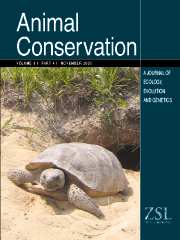Crossref Citations
This article has been cited by the following publications. This list is generated based on data provided by
Crossref.
Godfray, H. C. J.
Knapp, S.
Gaston, Kevin J.
and
O'Neill, Mark A.
2004.
Automated species identification: why not?.
Philosophical Transactions of the Royal Society of London. Series B: Biological Sciences,
Vol. 359,
Issue. 1444,
p.
655.
Godfray, H. C. J.
Knapp, S.
and
Gotelli, Nicholas J.
2004.
A taxonomic wish–list for community ecology.
Philosophical Transactions of the Royal Society of London. Series B: Biological Sciences,
Vol. 359,
Issue. 1444,
p.
585.
Godfray, H. C. J.
Knapp, S.
and
Mace, Georgina M.
2004.
The role of taxonomy in species conservation.
Philosophical Transactions of the Royal Society of London. Series B: Biological Sciences,
Vol. 359,
Issue. 1444,
p.
711.
Löbl, Ivan
and
Leschen, Richard A. B.
2005.
Demography of Coleopterists and Their Thoughts on DNA Barcoding and the Phylocode, with Commentary.
The Coleopterists Bulletin,
Vol. 59,
Issue. 3,
p.
284.
Schander, Christoffer
and
Willassen, Endre
2005.
What can biological barcoding do for marine biology?.
Marine Biology Research,
Vol. 1,
Issue. 1,
p.
79.
Barber, Paul
and
Boyce, Sarah L
2006.
Estimating diversity of Indo-Pacific coral reef stomatopods through DNA barcoding of stomatopod larvae.
Proceedings of the Royal Society B: Biological Sciences,
Vol. 273,
Issue. 1597,
p.
2053.
Kim, Ke Chung
and
Byrne, Loren B.
2006.
Biodiversity loss and the taxonomic bottleneck: emerging biodiversity science.
Ecological Research,
Vol. 21,
Issue. 6,
p.
794.
Jellinek, Thomas
Swanson, Kerry
and
Mazzini, Ilaria
2006.
Is the cosmopolitan model still valid for deep-sea podocopid ostracods?.
Senckenbergiana maritima,
Vol. 36,
Issue. 1,
Stokes, K. E.
O’neill, K. P.
Montgomery, W. I.
Dick, J. T. A.
Maggs, C. A.
and
Mcdonald, R. A.
2006.
Human Exploitation and Biodiversity Conservation.
Vol. 3,
Issue. ,
p.
489.
Lawrence, Anna
2006.
‘No Personal Motive?’ Volunteers, Biodiversity, and the False Dichotomies of Participation.
Ethics, Place & Environment,
Vol. 9,
Issue. 3,
p.
279.
Stokes, K. E.
O℉Neill, K. P.
Montgomery, W. I.
Dick, J. T. A.
Maggs, C. A.
and
McDonald, R. A.
2006.
The Importance of Stakeholder Engagement in Invasive Species Management: A Cross-jurisdictional Perspective in Ireland.
Biodiversity and Conservation,
Vol. 15,
Issue. 8,
p.
2829.
Patterson, David J.
Remsen, David
Marino, William A.
Norton, Cathy
and
Page, Rod
2006.
Taxonomic Indexing—Extending the Role of Taxonomy.
Systematic Biology,
Vol. 55,
Issue. 3,
p.
367.
Schill, R. O.
and
Steinbrück, G.
2007.
Identification and differentiation of Heterotardigrada and Eutardigrada species by riboprinting.
Journal of Zoological Systematics and Evolutionary Research,
Vol. 45,
Issue. 3,
p.
184.
Borrell, Brendan
2007.
The big name hunters.
Nature,
Vol. 446,
Issue. 7133,
p.
253.
Pearson, David L.
and
Cassola, Fabio
2007.
Beetle Conservation.
p.
47.
Johnson, Craig R.
2007.
Seaweed invasions: conclusions and future directions.
botm,
Vol. 50,
Issue. 5-6,
p.
451.
Pearson, David L.
and
Cassola, Fabio
2007.
Are we doomed to repeat history? A model of the past using tiger beetles (Coleoptera: Cicindelidae) and conservation biology to anticipate the future.
Journal of Insect Conservation,
Vol. 11,
Issue. 1,
p.
47.
Boonham, Neil
Glover, Rachel
Tomlinson, Jenny
and
Mumford, Rick
2008.
Sustainable disease management in a European context.
p.
355.
Boonham, Neil
Glover, Rachel
Tomlinson, Jenny
and
Mumford, Rick
2008.
Exploiting generic platform technologies for the detection and identification of plant pathogens.
European Journal of Plant Pathology,
Vol. 121,
Issue. 3,
p.
355.
WHEELER, QUENTIN D.
2008.
Undisciplined thinking: morphology and Hennig’s unfinished revolution.
Systematic Entomology,
Vol. 33,
Issue. 1,
p.
2.




